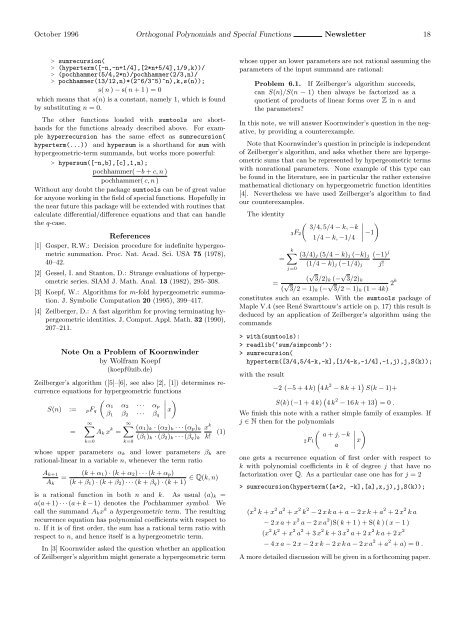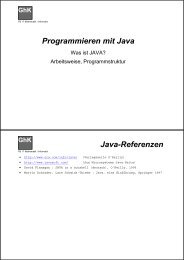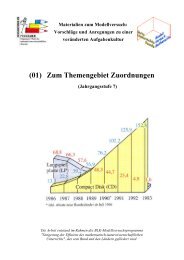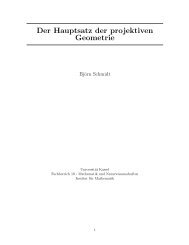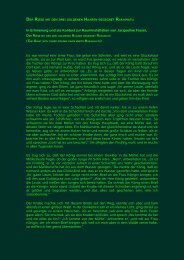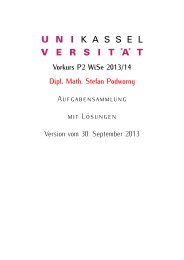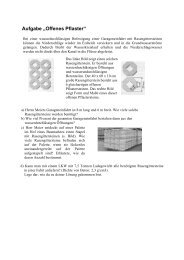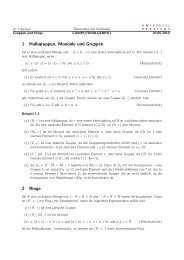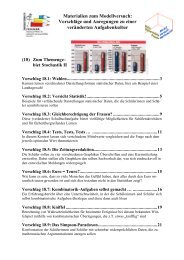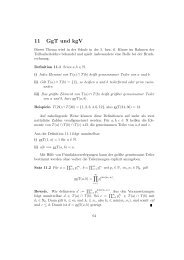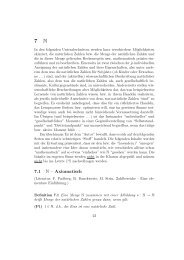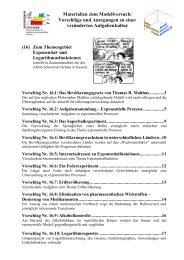Orthogonal Polynomials and Special Functions
Orthogonal Polynomials and Special Functions
Orthogonal Polynomials and Special Functions
You also want an ePaper? Increase the reach of your titles
YUMPU automatically turns print PDFs into web optimized ePapers that Google loves.
October 1996 <strong>Orthogonal</strong> <strong>Polynomials</strong> <strong>and</strong> <strong>Special</strong> <strong>Functions</strong> Newsletter 18<br />
> sumrecursion(<br />
> (hyperterm([-n,-n+1/4],[2*n+5/4],1/9,k))/<br />
> (pochhammer(5/4,2*n)/pochhammer(2/3,n)/<br />
> pochhammer(13/12,n)*(2^6/3^5)^n),k,s(n));<br />
s( n ) − s( n + 1 ) = 0<br />
which means that s(n) is a constant, namely 1, which is found<br />
by substituting n = 0.<br />
The other functions loaded with sumtools are shorth<strong>and</strong>s<br />
for the functions already described above. For example<br />
hyperrecursion has the same effect as sumrecursion(<br />
hyperterm(...)) <strong>and</strong> hypersum is a shorth<strong>and</strong> for sum with<br />
hypergeometric-term summ<strong>and</strong>s, but works more powerful:<br />
> hypersum([-n,b],[c],1,n);<br />
pochhammer( −b + c, n )<br />
pochhammer( c, n )<br />
Without any doubt the package sumtools can be of great value<br />
for anyone working in the field of special functions. Hopefully in<br />
the near future this package will be extended with routines that<br />
calculate differential/difference equations <strong>and</strong> that can h<strong>and</strong>le<br />
the q-case.<br />
References<br />
[1] Gosper, R.W.: Decision procedure for indefinite hypergeometric<br />
summation. Proc. Nat. Acad. Sci. USA 75 (1978),<br />
40–42.<br />
[2] Gessel, I. <strong>and</strong> Stanton, D.: Strange evaluations of hypergeometric<br />
series. SIAM J. Math. Anal. 13 (1982), 295–308.<br />
[3] Koepf, W.: Algorithms for m-fold hypergeometric summation.<br />
J. Symbolic Computation 20 (1995), 399–417.<br />
[4] Zeilberger, D.: A fast algorithm for proving terminating hypergeometric<br />
identities. J. Comput. Appl. Math. 32 (1990),<br />
207–211.<br />
Note On a Problem of Koornwinder<br />
by Wolfram Koepf<br />
(koepf@zib.de)<br />
Zeilberger’s algorithm ([5]–[6], see also [2], [1]) determines recurrence<br />
equations for hypergeometric functions<br />
<br />
α1 α2 · · · αp <br />
S(n) := <br />
pFq<br />
x<br />
<br />
=<br />
k=0<br />
β1 β2 · · · βq<br />
∞<br />
Ak x k ∞ (α1)k · (α2)k · · · (αp)k<br />
=<br />
(β1)k · (β2)k · · · (βq)k<br />
k=0<br />
whose upper parameters αk <strong>and</strong> lower parameters βk are<br />
rational-linear in a variable n, whenever the term ratio<br />
Ak+1<br />
Ak<br />
=<br />
x k<br />
k!<br />
(k + α1) · (k + α2) · · · (k + αp)<br />
∈ Q(k, n)<br />
(k + β1) · (k + β2) · · · (k + βq) · (k + 1)<br />
is a rational function in both n <strong>and</strong> k. As usual (a)k =<br />
a(a + 1) · · · (a + k − 1) denotes the Pochhammer symbol. We<br />
call the summ<strong>and</strong> Akx k a hypergeometric term. The resulting<br />
recurrence equation has polynomial coefficients with respect to<br />
n. If it is of first order, the sum has a rational term ratio with<br />
respect to n, <strong>and</strong> hence itself is a hypergeometric term.<br />
In [3] Koornwider asked the question whether an application<br />
of Zeilberger’s algorithm might generate a hypergeometric term<br />
(1)<br />
whose upper an lower parameters are not rational assuming the<br />
parameters of the input summ<strong>and</strong> are rational:<br />
Problem 6.1. If Zeilberger’s algorithm succeeds,<br />
can S(n)/S(n − 1) then always be factorized as a<br />
quotient of products of linear forms over Z in n <strong>and</strong><br />
the parameters?<br />
In this note, we will answer Koornwinder’s question in the negative,<br />
by providing a counterexample.<br />
Note that Koornwinder’s question in principle is independent<br />
of Zeilberger’s algorithm, <strong>and</strong> asks whether there are hypergeometric<br />
sums that can be represented by hypergeometric terms<br />
with nonrational parameters. None example of this type can<br />
be found in the literature, see in particular the rather extensive<br />
mathematical dictionary on hypergeometric function identities<br />
[4]. Nevertheless we have used Zeilberger’s algorithm to find<br />
our counterexamples.<br />
The identity<br />
=<br />
3F2<br />
k<br />
j=0<br />
<br />
3/4, 5/4 − k, −k <br />
<br />
1/4 − k, −1/4 −1<br />
<br />
(3/4)j (5/4 − k)j (−k)j<br />
(1/4 − k)j (−1/4)j<br />
(−1) j<br />
(<br />
=<br />
√ 3/2)k (− √ 3/2)k<br />
( √ 3/2 − 1)k (− √ 3/2 − 1)k (1 − 4k) 2k<br />
constitutes such an example. With the sumtools package of<br />
Maple V.4 (see René Swarttouw’s article on p. 17) this result is<br />
deduced by an application of Zeilberger’s algorithm using the<br />
comm<strong>and</strong>s<br />
> with(sumtools):<br />
> readlib(‘sum/simpcomb‘):<br />
> sumrecursion(<br />
hyperterm([3/4,5/4-k,-k],[1/4-k,-1/4],-1,j),j,S(k));<br />
with the result<br />
−2 (−5 + 4 k) 4 k 2 − 8 k + 1 S(k − 1)+<br />
S(k) (−1 + 4 k) 4 k 2 − 16 k + 13 = 0 .<br />
We finish this note with a rather simple family of examples. If<br />
j ∈ N then for the polynomials<br />
<br />
a + j, −k <br />
<br />
2F1<br />
a x<br />
<br />
one gets a recurrence equation of first order with respect to<br />
k with polynomial coefficients in k of degree j that have no<br />
factorization over Q. As a particular case one has for j = 2<br />
> sumrecursion(hyperterm([a+2, -k],[a],x,j),j,S(k));<br />
(x 2 k + x 2 a 2 + x 2 k 2 − 2 x k a + a − 2 x k + a 2 + 2 x 2 k a<br />
− 2 x a + x 2 a − 2 x a 2 )S( k + 1 ) + S( k ) ( x − 1 )<br />
(x 2 k 2 + x 2 a 2 + 3 x 2 k + 3 x 2 a + 2 x 2 k a + 2 x 2<br />
− 4 x a − 2 x − 2 x k − 2 x k a − 2 x a 2 + a 2 + a) = 0 .<br />
A more detailed discussion will be given in a forthcoming paper.<br />
j!


